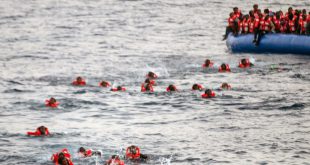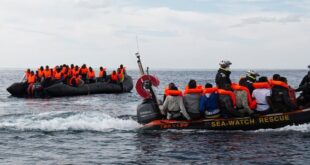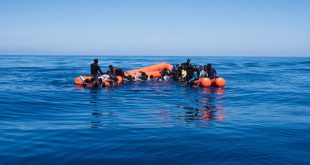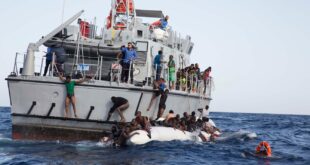The EU is financing and perpetuating the cycle of suffering of migrants in Libya by forcing people to return to notorious detention centres, says the head of a major charity.
Joanne Liu, the president of Medecins Sans Frontieres (MSF) International, told reporters on Thursday (7 September) that European governments are complicit in torture and that the EU’s policy of ring fencing migrants in Libya must come to an end.
“European leaders need to face up to the fact that forcing people back to Libya is an obliteration of their basic humanity. This is their so-called success, knowingly feeding people to criminals, and tell me, how can we be OK with this?” she said in Brussels.
In a letter, Liu accused the governments in Europe, as well as the European Commission, of setting up policies that feed a criminal system of abuse by sending people back into the hands of armed militia groups.
“Pregnant women are especially targeted in detention centres, even singled out to be raped,” she said, following her visits to government-controlled detention centres in Libya’s capital city, Tripoli.
Liu said some 200 people, who had been intercepted at sea by the Libyan coast guard, had ended up in the centre she visited, where pregnant women were being raped.
Libya’s struggling UN-recognised government officially oversees some two dozen centres via its directorate for combating illegal migration (DCIM). The DCIM counts militias among its own staff, according to an internal report from the EU’s border mission, EUbam.
The EU is financing the International Organization for Migration (IOM) and the UN’s refugee agency (UNHCR) to improve the conditions at government-run centres and help return people back to their home countries.
But MSF described the efforts by the IOM and UNHCR in Libya “as an illusion” in addressing the larger issue of chaos that reigns throughout the country.
In a tweet to MSF following Liu’s statements, the IOM Brussels office said that the agency “does not sponsor prisons. Alternatives needed to Libyan detention, but we work to improve conditions.”
Earlier this year, the IOM said it had improved the Tripoli-based Trig al Seka and Tareq al Mattar detention centres.

In August, it had also met with Libyan authorities in Tunis “to discuss an initial work plan and the establishment of a coordination body to facilitate rescues at sea.”
The UN had demanded that the most vulnerable people be released from the centres in late August, following an almost €10-million pledge by the UK to the Libyan authorities to tackle terrorism.
But the demands to release people from the detentions and open up legal routes for them to escape Libya is likely to fall on deaf ears.
On Thursday, Germany’s interior minister, Thomas de Maziere, told German media that anyone who arrives in Europe with the help of smugglers should be denied asylum.
Fewer people leaving Libya
The commission is also praising its own policies in Libya, noting that arrivals in Italy in August had dropped by 81 per cent, compared to the same month last year, and another 66 per cent between July and August this summer.
“This also reflects the positive work that we have done along the Central Mediterranean route,” the EU commissioner for migration, Dimitris Avramopoulos, said on Wednesday.
But recent media reports paint a different scenario amid claims that the Italian government is indirectly paying off the Libyan militias to keep people from disembarking in the first place.
Italy has denied the claim. The EU commission has also refused to respond, noting that its policy of training the Libyan coast guard and financing major UN charities in the war-torn country are producing the desired results.
In July, the commission announced a €46 million programme to reinforce the Libyan coast guard.
Last month, three NGOs suspended rescue operations at sea following reports of a hostile Libyan coast guard. The guard was accused of firing warning shots at the boats while in international waters.
Nikolaj Nielsen/EUobserver
 THE AFRICAN COURIER. Reporting Africa and its Diaspora! The African Courier is an international magazine published in Germany to report on Africa and the Diaspora African experience. The first issue of the bimonthly magazine appeared on the newsstands on 15 February 1998. The African Courier is a communication forum for European-African political, economic and cultural exchanges, and a voice for Africa in Europe.
THE AFRICAN COURIER. Reporting Africa and its Diaspora! The African Courier is an international magazine published in Germany to report on Africa and the Diaspora African experience. The first issue of the bimonthly magazine appeared on the newsstands on 15 February 1998. The African Courier is a communication forum for European-African political, economic and cultural exchanges, and a voice for Africa in Europe.


























